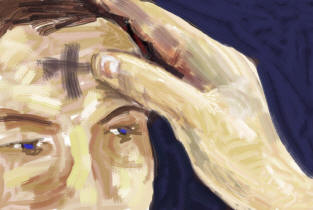Thinking Needs Fasting
(c) Gerhard Altendorf 2007
Translation by Jochen Riess

Carnival is over. It is no longer the true, ancient, medieval event it used to be. That has ceased to exist long ago. What we see these days is cheap entertainment. A little bit of fun, some jokes, plenty of business – and lots of vanity. Only occasionally occur moments of real fun, great humour, of irony and parody. Carnival as a ritual has lost its purifying property as perceived when religious traditions were still alive and practiced. On Ash Wednesday one would attend mass as a human being fully aware of one’s daily alienation – at least for that moment and sometimes a little longer – so as to allow images and words about the passion of Christ exercise their influence.

Our time has abandoned the days related to Light: Advent, Christmas, and Epiphany. Forgotten are the features like expectation, wishes, presents, candlelight and joy. What happens when the exuberance, the orgiastic experience, the excesses, the drunkenness and all other exaggerations have vanished? All festivities are temporal. Even in sport success will fade away, the triumph of the victorious, all success in political or private matters will show its real face. Fasting and sobriety are once more in demand.

To enter the period of Lent or passion requires a definite resolution. Some do still practice it. Yet all of us should grant ourselves time for contemplation - sometimes. Thinking needs fasting. Whoever is willing to turn inward ought to be sober – disillusioned for a particular period.
It is quite obvious that the emotional atrophy of modern life calls for an occasional compensation through a hypertrophy of feelings and exposure to events of a different calibre. Because even the greatest wealth of material goods cannot make up for the lack of emotional balance. Discontent prevails in our society, although we have more means at our disposal than any previous generation. We avoid remembering and moments of contemplation. Yet in everybody’s life comes the moment when he or she will have to face events of their own past. “Not in the mood”, “not yet”, “not available” don’t apply, because the world in general und human events in particular can only fascinate and exercise attraction if human beings ask for more than merely to exist in silence without investing energy of some sort in their own favour.
It is not enough to know what you don’t want; you ought to know what you want. Part of it is to reflect on social and human conditions of people, to identify what is waiting in humans to be challenged by fellow man or events. Most outbursts of violence among whole populations as well as in individual cases are usually reactions to and expression of the fact that people in their majority are reduced to oppressed, forgotten, despised and misused creature.
“Shut up or I break your back!” shouts a drinking and smoking young mother in response to her tired and unhappy youngster. (Of course not in our place but somewhere in another part of Berlin). Somebody’s “And now?” may mean: “What will he do once he’s old enough to hit back?” The hopeful may believe that one day he or she might find access to his or her own opportunities, enter a space where different rules apply, find people who command speech and find the right words, who respect fellow man’s suffering, notice his or her wounds and offer assistance.
In spite of all alienation will religious energy remain on the outlook for meaning and reassurance, for healing response to suffering. A time of fasting implies that whatever is alive in a human being will have to leave behind the usual banality of life (at least for a time) in order establish a conscious contact with oneself in favour of an experience of true identity. Whoever wishes to discover more of one’s true self needs to experience both the carnival of life as well as the introvert period of Lent and passion.
Once upon a time Jesus spoke of “a good measure, pressed down, shaken together”, that will be poured into people’s lap (Luke 6:38). Whenever a little “I” starts to consider it, it has already entered his or her Lent.

















